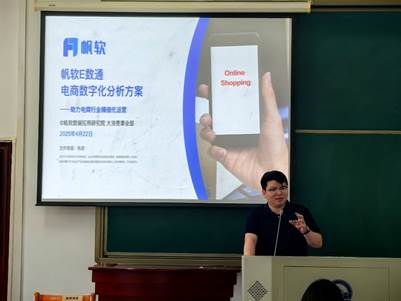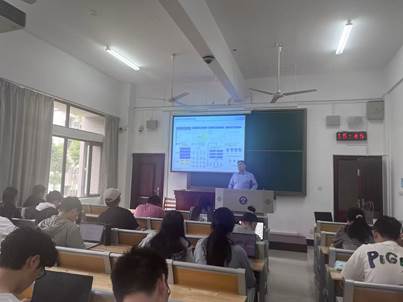On April 22nd and 29th, during the undergraduate course Digital Platforms taught by Associate Professor Chaocheng He from the Department of Digital Economy and Intelligent Business, two exciting lectures were delivered to students by our school's industry mentors: Fei Jiang, General Manager of the Central China Region of Fanruan Software Co., Ltd. (hereinafter referred to as "Fanruan"), and Junfeng Ma, General Manager of the Hubei Region of Fanruan.
Junfeng Ma presented the Fanruan E-Data Connect, an e-commerce digital analysis solution, which aims to solve the challenges of data integration and application in the e-commerce industry and drive enterprises to transform from traffic-driven operations to refined consumer management. Focusing on industry pain points such as difficult platform data acquisition, low efficiency in multi-source data integration, and the lack of data analysis scenarios, he explained three major solutions: automated data collection, indicator system and scenario-based analysis, and integration of operations and finance. He also introduced the optimization paths for core application scenarios, including market insight, store operation, financial reconciliation, and supply chain optimization.

Fei Jiang lectured on Fanruan's Digital Construction Approach, systematically analyzing the core logic and practical achievements of the company's digital transformation and upgrading, covering aspects such as strategic formulation and execution path, business process optimization and LTC management, informationization and data-driven decision-making, organizational performance and cultural consensus, and future vision and customer value. Fei Jiang pointed out that Fanruan's path to digital construction is not just a technological upgrade but a deep integration of strategy, process, culture, and data. Fanruan's practice logic of "starting from the end goal" provides a complete reference for the industry, from top-level design to on-the-ground implementation.

Inviting industry mentors into the classroom is an important and regular practice in talent training to enhance undergraduates' industrial awareness. In these two lectures, industry experts used real cases to analyze how Fanruan's digital solutions address pain points such as difficult data acquisition and low integration efficiency. Through learning from corporate cases, students not only mastered the application logic of data analysis tools but also gained a profound understanding of the core value of digital platforms in enterprise decision-making and innovation. Relevant persons in charge of the Department of Digital Economy and Intelligent Business of the school stated that they will strive to leverage the important role of industry mentors in cultivating composite talents, helping students comprehensively improve their literacy in the wave of the digital economy.
After listening to the lectures by the two industry mentors, students were deeply inspired, and some shared their learning insights.
Qingxu Tan: The two special practical courses have brought me fruitful gains. The two industry mentors, from Fanruan's perspective, helped us understand the digital transformation and construction of the e-commerce industry, and clarified the operational processes of e-commerce platforms and the thinking logic behind digital solutions. Taking Fanruan's financial reimbursement as an example, the mentors made me truly feel the importance of financial analysis for e-commerce operations and its current pain points. Through these two courses, I can re-understand and learn university courses from an enterprise's perspective, allowing knowledge to take root in practical applications. I believe these two courses serve as an excellent bridge between university and industry, connecting the knowledge we learn in school with future careers and helping us transition from university to society.
Zihao Liang: After listening to the industry mentors share Fanruan's digital practices, several details left a deep impression on me. Fanruan's digital transformation path was particularly enlightening. From passively responding to needs to using the FineBI tool to build decision-making models, they have proven that the value of data assets lies not in their volume but in their deep integration with business scenarios. This has overturned my understanding of digitalization—technology may become obsolete, but the ability to reconstruct business logic with a data-driven mindset is the moat for enterprises to navigate through cycles. This understanding will directly influence my future career choices: instead of being a tool executor, I aim to become a facilitator who creates business value with data.
Shuai Li: "Making data a productive force"—this is Fanruan's vision and a phrase repeatedly emphasized by Teacher Jiang in class. Through vivid cases, Teacher Jiang demonstrated how Fanruan helps enterprises solve pain points like difficult data acquisition and low integration efficiency through products such as Fanruan and FineBI. From retail and finance to manufacturing, data from different industries, under Fanruan's solutions, has transformed from disorganized numbers into "gold mines" driving business growth. It turns out that the theoretical knowledge we learn can play such a huge role in real corporate scenarios! I am looking forward to becoming a data analyst who can "master" data, creating value for enterprises with data and making data truly become a driving force for social progress.